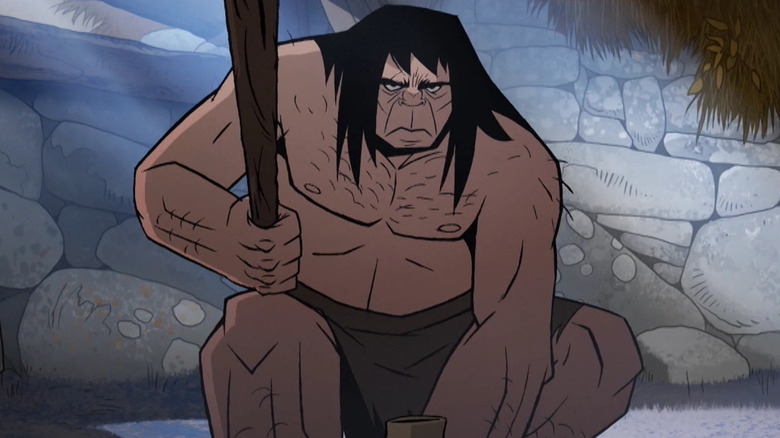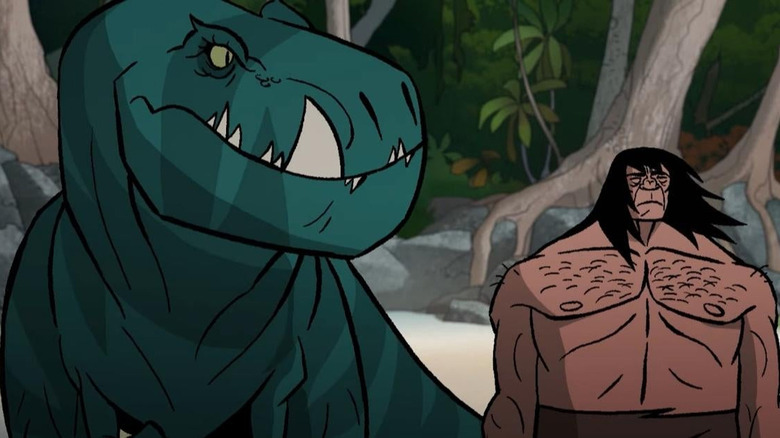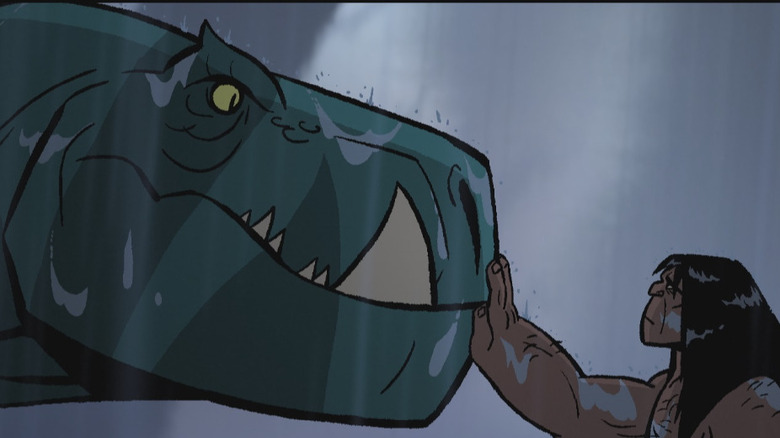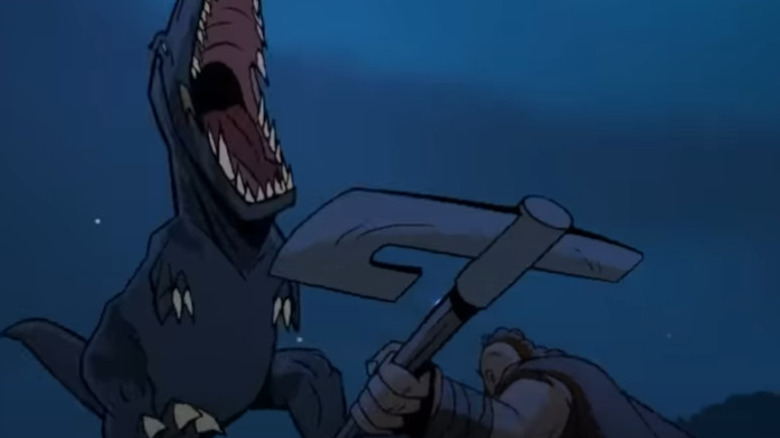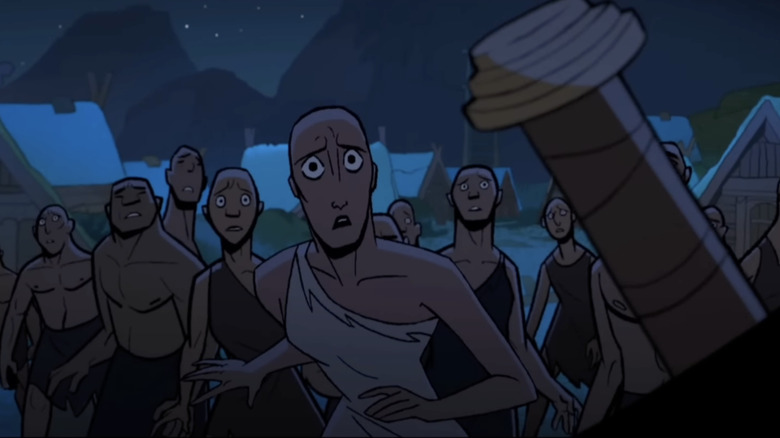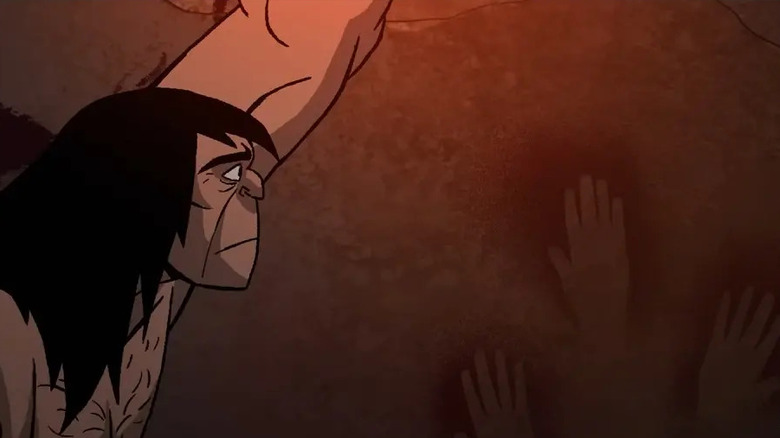Why Primal's Victorian Era Episode Could Be More Than Just An Interlude
When "England 1890" flashes crosses the thunderstorm in season 2, episode five of Genndy Tartakovsky's "Primal," any devoted viewer will find themselves scratching their heads before re-orientating themselves. Numerous speaking roles in English? Brandy-drinking Englishmen in tailored suits? How did we land in a world of dialogue? Or rather, why the time skip from the prehistoric age to the English Victorian age? The episode, titled "Primal Theory," throws the audience for a loop.
The previous episode ended in a jaw-dropping bloodbath, with the vengeful scorpion-marked Vikings on the trail of our main cast: the caveman Spear (Aaron LaPlante), T-rex Fang, and escaped slave Mira (Laëtitia Eïdo). The cliffhanger leaves you on the edge of your seat wondering how they will survive the next threat. So why pivot to a time period where Spear, Fang, and Mira have receded into fossils, their final fates unknown?
"Primal" is hardly the first animated series to drop abrupt time skips exceeding eons beyond the main character's estimated lifespan. "Adventure Time" did this as a means to contemplate the mortality of our main heroes in a "your heroes will die someday" fashion. But there's a method to Tartakovsky's madness here.
The Primal anthology
In the past, Genndy Tartakovsky shared with IndieWire an interest in spinning-off "Primal" into an anthology series: "With this brand, it can be about aliens, World War II. We'll see if anybody is excited about it." Likely, "Primal Theory" is an effort to condition us for a variety of narratives — floating eons and time periods outside of Spear's story — as well as serve as a pitch that multiple stand-alone stories can work well with the vivid style animation style of "Primal" (and boy, I say it really makes its case). It's unknown if the rest of season 2 will have surprise dissolves into other time periods outside of Spear and Fang's, but now we're conditioned to expect the unexpected.
"Primal Theory" is also a relatively lighthearted break from the intensity and terrors that await Fang, Spear, and Mira as the Vikings go after them. But the far-off time period also shares the lifeblood of the world they live in, prehistoric or not.
The Primal theory
In "Primal Theory," we fall in medias res as a club of thinkers listen to the Primal Theory lecture of a fellow named Charles (Jacob Dudman), who is obviously loosely based on the evolutionary thinker Charles Darwin sans the surname (although Darwin died in 1882). Charles proposes:
"Over time, a species experiences random variations. We've seen this in a variety of birds... The species' need for survival focuses their characteristics to adapt, change. It is their primal instinct... We're not so dissimilar from the primal man from whence we came from."
He's referring to the Neanderthal, someone like Spear who at their glance would fit that description. Charles continues to describe how the building of civilization has buried their primal instincts:
"Of course we have multiple layers masking our true inner selves: the uniform of society, education in its highest form, lavish indulgences. We have evolved beyond creation's expectations. But under the right circumstances, facing a primeval threat, I assure gentlemen that our evolution will revert back to our primal savage form, fighting for survival at the very cost of humanity."
When the homeowner and society host Darlington (Jeremy Crutchley) dissents, we get a split-second shot of his eyes widening, a visual motif of Spear's facial expressions. To him and the historical society, Charles's theory insults their propriety. But the split-second shot foreshadows that he wouldn't be so immune from Charles' theory.
And there you have it!
So fate cruelly tosses the thinkers a test to Charles's theory. Right on time, the men are besieged by an escaped asylum convict, the cannibalistic Mad-Man (Fred Tatasciore). The bare-chest build of the Mad-Man himself is deliberately close to Spear's design template, though it has none of his mercy or code.
Through wild brawls, Charles's theory is proven by Darlington's desperation to defend his manor. Darlington's improvised weaponry also goes backwards in time — from a gun, to his own fists, to a bow and arrow, and a bone club, and the spear. He impales the Mad-Man's skull and finds himself shirtless and blood-drenched, indistinguishable from their conception of the Neanderthal. Charles's final line is a punchline, hilarious in that it undercuts the consequences (Darlington's ultimate gaze of self-disgust and the other victims scattered on the manor floor), yet befitting for the sidetracked Charles.
"And there you have it!" Charles chirps, like a sport's announcer who has declared the winner.
How it connects?
By planting us in this Victorian circle, we ponder its juxtaposition to the (also anachronistic) prehistoric world that Spear and Fang belong to.
The society itself is its own world-building, as if Tartakovsky wants us to further sit on the idea of civilization and its multitudes within its own province and time. To cement the insularity of the male intellectual world, we hear the screams of an offscreen woman. "Miss Kensington, the cook. Poor woman," Darlington utters. It's an odd dab of idiosyncrasy. Her scream, yet lack of full-bodied presence, feels deliberate to underline the patriarchal gathering — perhaps to avert the viewers' eyes as well. It's a contrast to the dynamic women we witnessed onscreen throughout "Primal" in multiple roles of morality and cultural adherences: a coven witch (a cult member who initially enslaves but later frees Spear and Fang), the Viking Rikka (both a protective warrior mother and also a ruthless slaver), and Mira herself (a slave and fighter).
On the fringes of civilization
The lack of empathic interiority for the institutionalized Mad-Man — yes, the sensationalized violent caricature of a mentally ill person — does also stand out because we're situated in the subjectivity of high-society intellectuals. This is compounded by previous explorations into the sympathetic headspace of antagonistic forces, like the Viking father and son (who have an extended mourning sequence in the aftermath of Spear's carnage) and the dying Argentinosaurus devoured away by a ghastly infection.
Throughout season 2 of "Primal," we explore Spear's disassociation with civilization, his manner of observing from afar and seeing civilization as "the other" instead of the other way around. Spear himself is someone, while capable of having friendly relations with amiable civilizations like the Celtics, never settles comfortably within civilization and considers himself primal at heart. Charles speaks of civilization and evolution burying the primal instincts; Spear refuses to be tethered by the uniforms of society — though that doesn't mean Spear himself forgoes a moral code. In the grand scheme, "Primal Theory" feels less about Charles being proven right and more about being the outsider looking into a civilization.
"Primal Theory" isn't just a random interlude — it's the show reinforcing what it has always been about all along.
